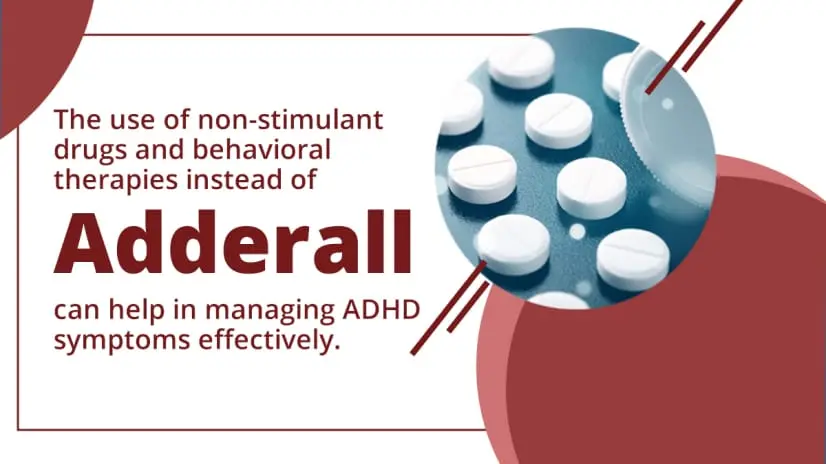
Adderall Shortages: Finding Alternative Treatments
Clinically Reviewed by:
Adderall is a medicine used for people with ADHD to help them focus and stay calm. However, Adderall is a controlled substance in the United States, and more and more people are being prescribed Adderall every day; shortages of the drug are not uncommon. Some people seek alternatives due to concerns about side effects, dependency, or because the drug is constantly out of stock. Keep reading to learn more.

Key Takeaways
There are diverse options for people looking to treat ADHD without taking Adderall, including natural supplements. Here’s what you need to know:
- The use of non-stimulant drugs and behavioral therapies instead of Adderall can help in managing ADHD symptoms effectively.
- Lifestyle changes such as regular exercise with a doctor’s advice can greatly improve mental well-being.
- Talking with your doctor can help in learning about the risks and exploring safe Adderall alternative options.
Indiana Center for Recovery can help you overcome an Adderall addiction. Call (844) 650-0064 for more information.
Science Behind Adderall
Adderall is a prescription medication commonly used to address attention-deficit hyperactivity disorder (ADHD) symptoms. It works by containing two active ingredients, amphetamine, and dextroamphetamine, which are stimulants that affect neurotransmitters in the brain. By increasing the levels of certain chemicals, Adderall helps enhance cognitive function and focus, improving attention and reducing impulsivity.
It is particularly effective in managing ADHD symptoms, such as difficulty staying focused and controlling behavior. While Adderall can be beneficial for those diagnosed with ADHD, it is essential to use it under medical supervision, as its misuse or dependence can lead to adverse effects. Always stay in touch with a healthcare professional for proper guidance and monitoring.
Side Effects and Need for Adderall Alternatives
Adderall, a widely prescribed medication in the United States, is not without its drawbacks. While it can effectively address symptoms of ADHD and serve as one of the cognitive enhancers, it comes with potential side effects and considerations. Common side effects include:
- Weight loss
- Insomnia
- Increased heart rate
- Nervousness
- Dizziness
- Loss of appetite
- Headache
- Digestive issues
Severe Adderall effects can include cardiovascular problems like increased blood pressure and strokes, particularly in people with pre-existing conditions. Psychiatric side effects may manifest as psychosis or hallucinations.
Considering the side effects, individuals might explore Adderall alternatives or consult medical professionals for personalized solutions. Additionally, given that Adderall is a controlled substance, it is vital to use it only under proper medical supervision to reduce the risk of misuse.
Understanding Natural Adderall Alternatives
Natural alternatives to Adderall, like natural nootropic supplements like ginkgo biloba containing ingredients like amino acids, offer promising options. Amino acids such as L-tyrosine and L-theanine have a high potential for improving mental function and focus without the risk of severe side effects associated with Adderall XR. Here are some notable natural products that you can use:
Caffeine
Caffeine, commonly found in coffee, tea, and energy drinks, is a natural stimulant to enhance alertness and concentration. It blocks adenosine receptors in the brain, promoting wakefulness and improved cognitive function. However, excessive consumption may lead to jitters, insomnia, and increased heart rate.
Ginkgo Biloba
Ginkgo biloba is another natural supplement that some people consider an alternative to Adderall for improving focus and cognitive function. Ginkgo Biloba, extracted from the ginkgo tree leaves, is known for its various purposes, including enhancing memory and mental sharpness. It contains antioxidants that help combat oxidative stress and improve blood circulation, which can enhance memory and mental clarity.
Panax Ginseng
Panax Ginseng, a traditional herb used in Chinese medicine, is believed to boost energy levels, reduce fatigue, and enhance cognitive performance. It contains ginsenosides that may improve brain function by reducing inflammation and increasing neurotransmitter activity.
Rhodiola
Rhodiola is extracted from the roots of Rhodiola rosea and is an adaptogenic herb famously used in traditional medicines. It helps the body to deal with stress and promotes overall well-being. It is believed to improve mood regulation, reduce tiredness, and improve mood by regulating stress hormones and neurotransmitters in the brain.
While some people report positive effects when using Rhodiola rosea as a supplement for ADHD symptoms. However, scientific evidence supporting its effectiveness specifically as an alternative to Adderall is limited.
Omega-3 Fatty Acids
Omega-3 fatty acid is the best natural alternative. It is found in fatty fish like salmon, and supplement forms are essential for brain health and cognitive processes. They play a crucial role in neurotransmitter function, neuronal communication, and brain development, potentially improving focus, attention, and memory.
These natural alternatives offer a safer and gentler approach to enhancing brain activity compared to prescription ADHD medications. However, it’s crucial to consult with a healthcare professional before incorporating any supplements into your routine.
Prescription Alternatives
If natural alternatives are not enough, several prescription medications can be considered by doctors for the treatment of ADHD. Each has its unique characteristics and mechanisms of action.
Concerta
Concerta is an extended-release form of the medication methylphenidate. It belongs to the stimulant class and plays an important role in enhancing neurotransmitters like dopamine and norepinephrine levels. The extended-release formula gradually releases the medication, offering a more consistent effect throughout the day.
Vyvanse
Vyvanse is a long-acting prescription drug containing lisdexamfetamine, a prodrug that gets converted into dextroamphetamine in the body. It helps regulate neurotransmitter levels and promotes healthy brain function. Vyvanse is known for its duration of action, providing sustained relief for individuals managing ADHD symptoms.
Strattera
Strattera is a non-stimulant drug that works by increasing the levels of hormones such as norepinephrine in the brain. Unlike immediate-release medications, Strattera has a longer duration of action.
That makes it suitable for individuals who may not respond well to stimulant medications or those concerned about their potential for abuse. These prescription alternatives, including Concerta, Vyvanse, and Strattera, offer diverse options for individuals seeking effective approaches to the treatment of ADHD.
Importance of Behavioral Approaches
Managing ADHD goes beyond medication, and behavioral approaches play a crucial role. Cognitive behavioral therapy (CBT) is a suitable alternative focusing on thoughts and behaviors. It helps individuals recognize and change patterns contributing to ADHD symptoms, promoting positive habits. Cognitive-behavioral therapy (CBT) helps reframe negative thought patterns and build self-esteem.
This therapy enhances mental health by addressing challenges like impulsivity and inattention. Engaging in activities that support a healthy nervous system, like exercise and relaxation techniques, also proves beneficial. It’s important to work with professionals to develop a personalized plan.
Coping Strategies for ADHD Patients
Incorporating lifestyle changes, adopting a healthy diet, and joining support groups can enhance the quality of life for individuals who are not suitable to take Adderall. These strategies not only provide practical tools for managing symptoms but also create a network of understanding and encouragement, making the journey of coping with ADHD more manageable.
Lifestyle Changes
Making small changes in daily life can have a significant impact on managing ADHD. Setting up a routine helps create structure and reduces unpredictability. Regular exercise is beneficial, as it helps to release excess energy and improves focus.
Maintaining a balanced and nutritious diet plan can also play a crucial role. Including foods containing omega-3 fatty acids, like salmon, and avoiding too much sugar and processed foods can lead to better overall well-being.
Support Groups
Being part of a support group can make a significant difference for people looking for Adderall alternatives. Connecting with others who understand the challenges provides a sense of harmony and alleviates feelings of isolation.
Support groups offer a secure setting to share experiences, tips, and encouragement. This shared understanding fosters a supportive environment where people can learn from each other and gain valuable insights into coping strategies.
Potential Risks and Limitations of Alternatives
Before choosing alternatives, it’s important to understand their potential risks and limitations. Some other options may not be suitable for everyone and could have adverse effects. For example, herbal supplements might interact with medications, leading to complications.
Additionally, alternative therapies may not have enough scientific evidence to support their effectiveness. It’s crucial to thoroughly research and consult healthcare professionals to weigh the risks and benefits before trying alternative treatments.
Talk To Your Doctor
Discussing alternative treatments with your doctor is essential. Your doctor can provide valuable insights into the potential risks and benefits of different options.
Talking to a medical expert can guide you through all the health information and misinformation out there. They can help you figure out what’s best for you. When you share openly with them, you can make smart choices about your health and lower the chances of unexpected problems, such as allergic reactions and other side effects.
Frequently Asked Questions (FAQ)
To focus without Adderall, consider exploring Adderall alternatives. Look for supplements with natural ingredients to support concentration without the side effects of Adderall.
Maintaining a balanced diet with nutrients like omega-3 fatty acids can positively impact focus. Consulting with healthcare professionals will help tailor a suitable plan for your needs, promoting focus and well-being without relying on prescription medications.
Vyvanse and Adderall are both famous medications used to treat ADHD, but they have key differences. Vyvanse contains lisdexamfetamine, which is inactive until metabolized in the body. That means it has a smoother onset and offset than Adderall, potentially causing fewer peaks and crashes.
Adderall, a combination of amphetamine salts, has an immediate impact. Additionally, Vyvanse is less likely to be misused since it is not active until metabolized, making it a popular choice for those concerned about potential abuse. Always consult with a medical professional for personalized advice.
Non-addictive alternatives to Adderall for managing impulsive behavior and ADHD include non-stimulant medications like atomoxetine or guanfacine. Behavioral or talk therapies, such as cognitive-behavioral therapy (CBT) and mindfulness techniques, are also effective.
Lifestyle changes like maintaining a consistent routine and getting regular exercise can complement these alternatives. Talking to a healthcare professional is vital to determine the most suitable alternative medications or therapies for individual needs.






 100% Confidential
100% Confidential